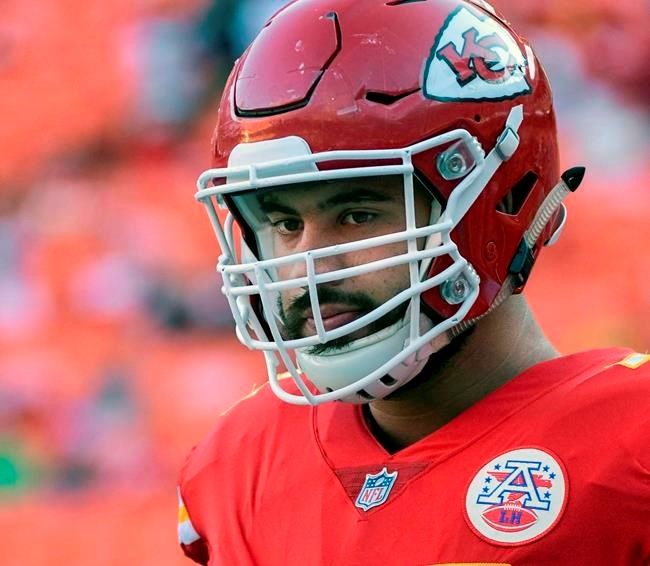MONTREAL — Kansas City Chiefs offensive lineman Laurent Duvernay-Tardif's decision to sit out the 2020 NFL season and focus on medicine wasn't an easy one, but his experience on the front lines of Quebec's COVID-19 fight at a long-term care home shaped that decision, his agent said Saturday.
The Canadian offensive lineman announced late Friday through social media he wouldn't take part in the upcoming NFL season, becoming the first player to opt out due to the COVID-19 pandemic.
"This is one of the most difficult decisions I have had to make in my life but I must follow my convictions and do what I believe is right for me personally," Duvernay-Tardif said in a message on Twitter. "This is why I have decided to take the Opt Out Option negotiated by the League and the NFLPA and officially opt out of the 2020 NFL season."
The 29-year-old from Mont-Saint-Hilaire, Que., the Chiefs' starting right guard, earned a medical degree from McGill University and has been working to fulfil his requirements to become a doctor in the off-season.
"It was a very difficult decision, like Laurent mentioned in the statement it was one of the toughest decisions he had to make in his life," said Sasha Ghavami, Duvernay-Tardif's agent and longtime friend, who saw him struggle with the decision over the past few days.
Ultimately, Duvernay-Tardif decided if he was going to take a COVID-19 related risk in a pandemic, it would be with patients, not on the football field.
"He preferred not to put himself in that position this season," Ghavami said. "If he was to be put in a position to take risks, it would be treating patients."
His experience answering the Quebec government's call for orderlies to work in long-term care homes hit hard with COVID-19 led him to his decision.
Duvernay-Tardif documented some of his time at Centre Gertrude-Lafrance, a facility in St-Jean-sur-Richelieu, south of Montreal, on his social media accounts.
"Laurent is a person with a lot of convictions and has always been true to his beliefs and what he thinks is the right thing to do for him," Ghavami said.
The NFL and its players association agreed earlier Friday to an opt-out clause for the upcoming season. Those who choose to voluntarily will reportedly receive a US$150,000 stipend rather than their contractual salary while those with medical opt-outs will receive $350,000.
The deadline to opt out is Aug. 3.
Duvernay-Tardif signed a four-year deal in February 2017. He recently renegotiated the contract and was scheduled to receive a base salary of US$2.75 million this season.
It's been a whirlwind 2020 for Duvernay-Tardif, his agent said: winning the Super Bowl in February, restrucuring his contract to stay with Chiefs and then heading into long-term care.
Ghavami said Duvernay-Tardif understood that could mean missing out on a possible Super Bowl repeat as Kansas City, led by quarterback Patrick Mahomes, remains a strong contender. His agent said he's confident he'll bounce back.
"It's a huge decision, it's very difficult for a professional athlete, you do everything in your power to be in a position to win," Ghavami said. "It's definitely a decision that makes it more difficult."
Kansas City drafted Duvernay-Tardif in the sixth round of the 2014 NFL Draft. He's been a starter at right guard since 2015.
Ghavami said Duvernay-Tardif's decision drew largely positive reaction on social media.
Among those weighing in was Quebec Health Minister Christian Dube.
"A heartbreaking decision for @LaurentDTardif, but which reflects his values as a healthcare professional," he wrote Saturday.
For his part, Ghavami said he couldn't be prouder.
"I'm proud because to be able to believe in something so strongly that you're willing to sacrifice your salary, potentially your job, and even take that position publicly and stay true to it is something I admire a lot," Ghavami said.
"When you look back at an athlete's career, their legacy, you can always look at wins, you can always look at losses, you can always look at championships, but what stands out are these types of moments."
This report by The Canadian Press was first published July 25, 2020.
Sidhartha Banerjee, The Canadian Press



